Mood-Boosting Foods:
How to Balance Your Neurochemistry With What You Eat
BY CHRISTINE BAILEY
 mood-boosting foods come in all shapes, sizes and flavors, but they all have one thing in common: they are exceptionally nutrient rich and nourishing for the body and mind. photo: lama-photography photocase.com
mood-boosting foods come in all shapes, sizes and flavors, but they all have one thing in common: they are exceptionally nutrient rich and nourishing for the body and mind. photo: lama-photography photocase.com
Although the list of symptoms that can result from even a mild nutrient deficiency is seemingly endless, mood swings, irritability, tiredness and poor concentration are all classic signs that your brain, and the rest of your body, are not receiving everything they need and crying out for some nutrient rich, mood-boosting foods..
Every single process and chemical reaction that takes place in your body depends on a regular supply of “micro” nutrients, such as vitamins and minerals, as well as “macro” nutrients, including protein, carbohydrates, fats and water, which we need in larger amounts—all of which are supplied by the powerful mood-boosting foods outlined in this article. It makes sense, then, that the raw materials you feed your body affect the way it works, and therefore have an impact on your moods and energy levels.
Nutrients for Mood
For optimal brain health, we need healthy nerves and balanced levels of neurotransmitters and blood sugar. Indeed, pretty much all the systems in our body need to be in good working order, even those governing our digestion and detoxification. Without a good supply of nutrients from mood-boosting foods, these systems will not function as well as they could. Even slightly reduced levels of key nutrients can affect how we think and feel.
For lowering homocysteine, the key vitamins are folic acid, B6 and B12. Studies have shown that supplementation of folic acid at 800mcg daily in people with slightly raised homocysteine improves memory and cognitive function.
B12, which is rich in many of the mood-boosting foods outlined below, is a particularly important B vitamin as we age. This is because it becomes more difficult to absorb from food, likely to be related to decreasing levels of stomach acid. A deficiency can lead to pernicious anemia. B12 deficiency is also more likely in vegans, as the main sources include meat, fish, eggs and dairy foods.
B6 not only helps lower homocysteine but is important in the production of the mood-boosting neurotransmitters dopamine and serotonin, making it useful for boosting mood and promoting sleep.
Fueling the Brain: The Homocysteine Connection
We have already seen that optimal brain health requires, among eating a regular supply of mood-boosting foods and a few other things, the appropriate balance of neurotransmitters. For this your body needs to provide the right building blocks, normally amino acids, as well as support the effective conversion of these components into neurotransmitters. One of the most important processes involved in maintaining an optimal balance is methylation. This is a series of chemical reactions that help create and balance neurotransmitters, build cells and protect your brain from damage. Methylation is also involved in the processing of phospholipids, a type of fat that supports the neurotransmitter receptors and is found in the myelin sheath that protects cells. Some people are not particularly efficient at methylating, and one way we can assess this is by measuring the level of an amino acid in your blood known as homocysteine.
Homocysteine is naturally converted into the amino acid known as S-adenosyl methionine. This conversion requires a range of B vitamins, including B2, B6, B12 and folate, as well as magnesium, zinc and trimethylglycine (TMG). A high level of homocysteine has been shown to double your risk of depression. A high homocysteine level has also been linked to decline in cognitive function, dementia and Alzheimer’s. You may be able to ask your healthcare practitioner to measure your homocysteine level or you can arrange for a private lab test through a qualified nutritionist. A low intake of these vitamins and minerals – particularly B vitamins – due to a lack of nutrient-rich, mood-boosting foods in your diet will lead to a raised level of homocysteine. In addition, a high intake of alcohol or caffeinated drinks, as well as smoking, can increase homocysteine levels.
A combination formula containing all the key nutrients for lowering homocysteine appears to be more effective than supplementing any one nutrient alone. As B vitamins and vitamin C are water-soluble, your body excretes them within a few hours of absorption. As a result, you’ll need to eat mood-boosting food sources rich in these vitamins (see the table below) every day.
A zinc deficiency may be linked to depression, addiction problems, loss of appetite, low mood and energy. Mood and energy is often low as zinc is required for the production of thyroid and adrenal hormones. Low levels of zinc have also been associated with anorexia.
The mineral magnesium is vital if nerve cells (neurons) are to communicate effectively with one another and it is involved in many enzyme reactions in the body and brain including the production of neurotransmitters. It is depleted by stress or lack of proper mood-boosting food intake and signs of deficiency can include anxiety, insomnia, muscle cramps, spasms and migraines.
Iron is important for the structure and function of the central nervous system.
Cognitive and behavioral disorders in children may be linked to low iron intake. Low iron levels can also affect overall energy levels. The most easily absorbable form of iron is haem iron, which comes from lean red meat and the darker meat from game, poultry and oily fish, as well as from eggs. The body finds it more difficult to absorb vegetarian sources of iron (e.g. in beans, pulses, dried fruit, leafy green vegetables). For optimal absorption combine your mood-boosting foods with other foods rich in vitamin C, such as fruit and raw or lightly cooked vegetables.
Essential fatty acids (EFAs) and phospholipids also play a crucial role in nerve messaging. See my book for a more in-depth explanation of how EFAs affect nerve cells and how to include more of the foods that are rich in EFAs in your diet.
Antioxidants play a protective role in optimal brain health and many of the mood-boosting foods outlined below are rich sources. Deeply colored fruits and vegetables are particularly rich sources, so aim to include a variety of these in your daily diet. Fruits and vegetables provide vitamins C and E and phytochemicals like flavonoids and carotenoids that help to protect the brain cells, neurotransmitters and the essential fats in the cell membranes from damage. Culinary herbs are also rich in phytonutrients, so include them liberally in cooking. Drink green tea too. High in antioxidants, it also contains an amino acid called L-theanine, which has been found to increase low levels of serotonin, dopamine and GABA, enhance learning and memory and reduce anxiety.
Maximizing Your Nutrient Intake
With our busy lives many of us eat on the run, which can prevent us from digesting and absorbing our food well even if we are making sure to regularly eat mood-boosting foods, or even choosing the most nutritious foods in the first place. To ensure that you are getting adequate nutrients from your diet, you need to follow some basic guidelines.
Highly processed, refined and overcooked foods are low in mood-boosting nutrients and often high in anti-nutrients and toxins meaning they can actually deplete our bodies of nutrients. Aim to eat as much fresh, unprocessed, unrefined food as possible. Ideally choose organic, local and seasonal produce.
Be careful not to overcook food, as heat destroys valuable nutrients – try to steam or quickly stir-fry vegetables, for example, and enjoy eating them “crunchy”, rather than boiling them until they are soft. Include more raw vegetables and fruits in your diet. Try to include a raw mixed salad daily. It is also important to eat a variety of mood-boosting foods to ensure that you are getting the full spectrum of required nutrients. Even the healthiest food, if eaten repeatedly, may leave you short of the nutrients it does not contain.
Bare Essential Foods and Nutrients for Optimal Brain Function and Healthy Mood
1. Serotonin
Role: Feel-good neurotransmitter. Needed for good moods, healthy sleep patterns and appetite control. Derived from tryptophan.
Nutrients Needed: Vitamins B3, B6, B12, C, copper, folic acid, iron, magnesium, manganese, zinc
Key Foods: Eggs, soy foods, spirulina, fish, cheese, pumpkin and sesame seeds, beans and pulses, game and red meat
2. Dopamine
Role: Stimulating neurotransmitter. Needed for feeling motivation and pleasure. Derived from amino acids tyrosine or its precursor phenylalanine.
Nutrients Needed: Vitamins B3, B6, biotin, folic acid, zinc
Key Foods: Eggs, soy foods, spirulina, poultry, dairy, fish and seeds (pumpkin and sesame).
Conscious Lifestyle Recommends for Serotonin and Dopamine
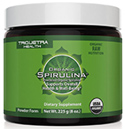 Organic Spirulina Powder
Organic Spirulina Powder
This deep, rich, ultra-fresh blue-green spirulina powder is some of the highest quality and purest available in the world at this time. Loaded with highly bioavailable nutrients, antioxidants and complete protein, Triquetra Health’s Organic Spirulina powder is an essential mood-boosting superfood.
3. Acetylcholine
Role: Neurotransmitter associated with memory and cognitive function. Requires choline. Choline is also an essential component of the neuron membranes (see below).
Nutrients Needed: Vitamins B5, B1, B12, C, acetyl-Lcarnitine (helps make acetylcholine and acts as an antioxidant)
Key Foods: Egg yolk, fish roe, liver (and other organ meats) and lecithin granules from health shops.
4. Healthy Neurons:
Role: Nerve cells required for general health and to transmit messages efficiently. Dives in blood sugar send mood, energy and concentration crashing.
Nutrients Needed: Antioxidants, B vitamins, calcium, essential fatty acids, folic acid, magnesium, Choline
Key Foods: Eggs, oily fish, lecithin granules, beef
Conscious Lifestyle Recommends for Acetylcholine and Healthy Neurons
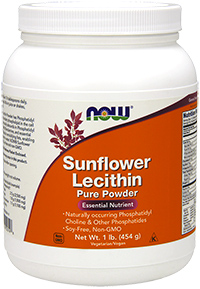 Now Foods Non-GMO Sunflower Lecithin Powder
Now Foods Non-GMO Sunflower Lecithin Powder
This tasty, non-GMO sunflower lecithin powder is a powerful mood-boosting supplement known for its ability to enhance neurotransmitter production. Supplies the body and mind with essential phospholipids that help to improve mood, mental cognition and reduce stress levels.
5. Even Blood Sugar Levels
Role: Dives in blood sugar send mood, energy and concentration crashing.
Nutrients Needed: B vitamins, zinc, chromium, omega 3 fats, magnesium, vanadium, vitamin D, alpha lipoic acid, manganese
Key Foods: Lean meat, nuts, seeds, oily fish, leafy green vegetables, seafood, mushrooms
Is A “Balanced” Diet Enough?
Sadly, eating fresh, unprocessed food will not guarantee that your body gets all the nutrients it needs and this type of diet alone is not a replacement for seeking out nutrient rich, mood-boosting foods. The balanced-diet argument is partly based on the notion that our soils are rich in minerals that are absorbed by the plants growing in them, which we subsequently eat. Yet with today’s intensive farming methods and artificial fertilizers, plants no longer need naturally mineral-rich soil to grow into the bumper-crop, oversized, uniform fruits and vegetables we now expect to see on our supermarket shelves.
Also, we do not always eat fruit and vegetables in season – many have been picked before they are ripe, stored for long periods of time and shipped across the world, none of which does their nutrient content much good.
The deficit of nutrients in our food is not the only factor that can leave us low in essential goodness. We are also exposed to many “anti-nutrients” – substances that deplete our stock of nutrients when they are processed in our bodies. Fizzy drinks, sugar, coffee, tea, alcohol and cigarettes interfere with our body’s ability to absorb minerals and make it even more essential to regularly consume special mood-boosting foods to make up for it.Overcooked (charred or blackened) meat contains chemicals that can encourage the production of potentially carcinogenic compounds and cause oxidative stress and damage to cells. By dramatically reducing your consumption of these substances, you can boost your body’s intake of vital health- and mood-enhancing nutrients.
If you are worried that you may be lacking in certain nutrients, you should see a qualified nutritionist, who will be able to carry out tests and suggest improvements to your diet and specific mood-boosting foods to overcome any deficiencies.
Good Mood Foods Summary
To maximize your nutrient levels and support a healthy mood:
+ Eat fresh, seasonal, preferably organic whole foods
+ Include a variety of deeply colored fruit and vegetables daily
+ Eat foods that have not been highly refined or processed
+ Reduce your intake of “anti-nutrients”: alcohol, coffee, tea, fizzy drinks, sugar, fried food, foods containing trans fats (e.g. margarine and manufactured sauces and salad dressings)
+ Avoid blackened, burnt meat or fish
+ Avoid recreational drugs as well as nicotine, alcohol, caffeine
+ Consider a homocysteine test to check B-vitamin levels and methylation
+ For a full assessment of your nutrient status, visit a nutritionist who will be able to give you guidance on your individual requirements
Nutrients and Their Mood-Boosting Food Sources
Vitamin A/Beta-carotene
Apricots, asparagus, broccoli, cantaloupe melon, carrots, kale, liver, pumpkin, spinach, sweet potatoes, watermelon
Vitamin D (cholecalciferol)
Cod liver oil, herring, mackerel, salmon, sardines
Vitamin E (alpha tocopherol)
Almonds, avocado, corn oil, hazelnuts, sunflower seeds and oil, walnuts, wheatgerm, whole-grain flour
Vitamin C (thiamine)
Blackcurrants, broccoli, Brussels sprouts, cabbage, grapefruit, guava, kale, lemons, oranges, papaya, peppers, potatoes, spinach, strawberries, tomatoes, watercress
Vitamin B1 (ascorbic acid)
Beef kidney and liver, brewer’s yeast, brown rice, chickpeas, kidney beans, pork, rice bran, salmon, soya beans, sunflower seeds, wheatgerm, whole-grain wheat and rye
Vitamin B2 (riboflavin)
Almonds, brewer’s yeast, cheese, chicken, mushrooms, wheatgerm
Vitamin B3 (niacin)
Beef liver, brewer’s yeast, chicken, eggs, fish, sunflower seeds, turkey
Vitamin B5 (pantothenic acid)
Blue cheese, brewer’s yeast, carrots, corn, eggs, lentils, liver, lobster, meats, peanuts, peas, soya beans, sunflower seeds, wheatgerm, whole-grain products
Vitamin B6 (pyridoxine)
Avocados, bananas, bran, brewer’s yeast, carrots, hazelnuts, lentils, rice, salmon, shrimps, soya beans, sunflower seeds, tuna, walnuts, wheatgerm, whole-grain flour
Vitamin B12 (cyanocobalamin)
Cheese, clams, eggs, fish, meat, milk and milk products
How to Get All the Vitamins and Minerals Mentioned in this Article From One, Whole Food Source
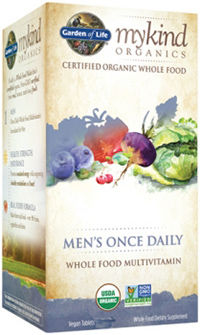
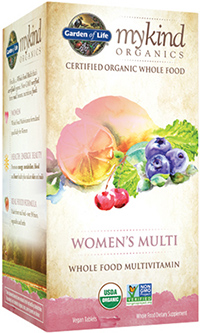 MyKind Organics 100% Whole Food Multivitamin: Men’s Formulation | Women’s Formulation
MyKind Organics 100% Whole Food Multivitamin: Men’s Formulation | Women’s Formulation
An ultra-high quality, high-potency, certified organic multivitamin and mineral supplement featuring all the mood boosting nutrients mentioned in this section from 100% whole food sources. The vitamins and minerals in this multivitamin and extracted from real organic superfoods like kale, blueberries and other fruits, vegetables and medicinal herbs. Non-GMO and free of synthetic ingredients.
Antioxidants
Avocados, beetroot, berries, broccoli, cabbage, carrots, figs, fish, garlic, grapes, green tea, kale, nuts, onions, peppers, prunes, raisins, seeds, sweet potatoes, tomatoes, watercress, wheatgerm
Biotin
Brewer’s yeast, brown rice, cashew nuts, cheese, chicken, eggs, lentils, mackerel, meat, milk, oats, peanuts, peas, soya beans, sunflower seeds, tuna, walnuts
Calcium
Almonds, Brazil nuts, cheese, kelp, milk, molasses, salmon (canned), sardines (canned), shrimp, soya beans, yogurt
Carbohydrates
Bread, corn, crackers, noodles, oats, pasta, potatoes, rice, sweet potatoes
Chromium
Beef, brewer’s yeast, chicken, eggs, fish, fruit, milk products, potatoes, whole grains
Coenzyme Q10
All foods, particularly, beef, mackerel, sardines, soya oil, spinach
Essential fatty acids (EFA’s)
Oily fish (e.g. mackerel, salmon, sardines, tuna); flax, sesame, (EFAs) pumpkin and sunflower seeds and their unprocessed oils
Conscious Lifestyle Recommends for EFA’s
Polar Power Wild Cold-Pressed Alaskan Salmon Oil
Hands down the worlds freshest, purest, most potent, best-tasting fish oil and source of EFA’s. Cold-pressed from fresh, wild Alaskan Salmon and free of all heavy metals, preservatives and adulterants. Exceptionally rich in naturally occuring Vitamin D (which also has been shown to promote neuron growth and boost mood).
Fibre
Barley, beans (e.g. borlotti, pinto, kidney, black-eyed, chickpeas), brown rice, buckwheat, fresh fruit, fresh vegetables, lentils, oats, rye, wholewheat
Folic acid
Barley, brewer’s yeast, fruits, chickpeas, green leafy vegetables, lentils, peas, rice, soya beans, whole wheat, wheatgerm
Iodine
Cod-liver oil, fish, oysters, table salt (iodized), seaweed, sunflower seeds
Iron
Cashew nuts, cheese, egg yolk, chickpeas, lentils, molasses, mussels, pumpkin seeds, seaweed, walnuts, wheatgerm, whole grains
Magnesium
Almonds, fish, green leafy vegetables, kelp, molasses, nuts, soya beans, sunflower seeds, wheatgerm
Manganese
Avocados, barley, blackberries, buckwheat, chestnuts, ginger, hazelnuts, oats, peas, pecans, seaweed, spinach
Potassium
Avocados, bananas, citrus fruits, lentils, milk, molasses, nuts, parsnips, potatoes, raisins, sardines (canned), spinach, whole grains
Protein
Dairy products, eggs, fish, meat, poultry, soya
Conscious Lifestyle Recommends for Protein
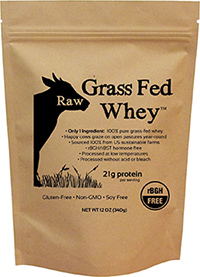 Raw, Organic Grass-Fed Whey Protein
Raw, Organic Grass-Fed Whey Protein
An ultra-high quality, organic whey protein that is low-temperature processed to maintain protein quality and nutrient absorbability. From pasture-raised, grass-fed, happy and humanely treated cows. Delicious, mixes easily in water and smoothies.
Selenium
Broccoli, cabbage, celery, chicken, egg yolk, garlic, liver, milk, mushrooms, onions, seafood, wheatgerm, whole grains
Sodium
Bacon, bread, butter, canned vegetables, ham, milk, table salt and most commercially processed and packaged foods
Sulphur
Cabbage, clams, eggs, fish, garlic, milk, onions, wheatgerm
Zinc
Egg yolk, fish, all meat, milk, molasses, oysters, sesame seeds, soya beans, sunflower seeds, turkey, wheatgerm, whole grains
This article on mood-boosting foods is excepted from Lift Your Mood With Power Food – More Than 150 Healthy Recipes To Change The Way You Think and Feel by Christine Bailey.
About The Author
Christine Bailey is an award winning nutritional therapist, functional nutrition practitioner, chef, author and broadcaster with over 18 years of experience. Trained in functional nutrition and with a passion for creating delicious nourishing recipes Christine has a reputation for transforming people’s health and love of real food. Find out more about her at christinebailey.co.uk





